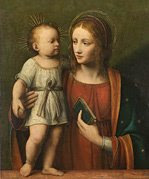What resources have you found that are winners in your homes? I'm trying to slim down my huge stacks of books in anticipation of our move. Fortunately, I'll be able to download most classical literature (speed is my only real concern). And we'll have Internet access for some historical and science studies. But still, there is something about having books and materials to actually hold, use and explore.
So, in each area:
Language Arts
History (both US and world)
Science
Religion (Bible, catechism, saints, etc.)
Fine Arts
Mathematics
Literature
Dramatic Arts, Photography, Hobbies, etc.
... and anything else you have found your family comes back to again, and again. My kids' academic level is now only middle and high school age ranges.
I'm thinking more along the lines of items that aren't grade specific as much as useful for the long term. This will help me make some decisions about any "can't live without, can't get in Peru" supplies. The ultimate goal is to perhaps get the most bang for the mass and weight.
Please leave your suggestions for Yvonne in the combox.










 Stumble It!
Stumble It!
5 comments:
When we moved to Korea in 02, we had a restricted weight allowance (25% our normal weight allowance) for household goods. Books and bookcases were the first thing I planned on bringing, then clothing, basic kitchen items and toys.
What we didn't bring was furniture, rarely used kitchen items (like my grandmother's china) and yard tools/etc.
I can't cut back on books esp in a foreign country where we do'nt speak the language....
so I'm no help :)
That's a hard one because each child is so different.
I LOVE 'the harp and the laurel wreath'' ... nearly any good poetry anthology... but I love that one not only for the poems but for the definitions.
I really like most of Seton's English books from second grade on (don't care much for fifth- but love 2, 3, 4, the Voyages they use for six and seven, and their 8th).
Never found a math program I was totally happy with, but then again I'm never happy with Math.
Liked the Greenleaf Guides and related materials for Egypt, Greece, and Rome.
There is a lot of good 'stuff' but I find as time goes on I really didn't NEED much (I definately needed SOME, but not nearly as much as I GOT).
Math -- Singapore, and then The Teaching Textbook Company from Pre-Algebra through Algebra 2. Mine go to college at that point, so I don't have anything past that to recommend.
English -- I like CHC's books for the youngers, Voyages for the olders, and Andrew Pudewa's Institute of Writing (or whatever it's called) released a good writing book last year that I think is called Elegant Writing. It's on his site, and it's not very expensive. He also has another book called A Word Write Now that has some great word lists and prompts for creative writing by theme. Spelling Power has worked well for us, too, although I sometimes use CHC's spelling books to supplement for my poor spellers.
Religion -- In the higher grades I really like Scott Hahn's Didache series. I have my youngers read lots of saint bios from Ignatius Press's Visions series as well as Image of God and Faith and Life.
Science -- For the olders I like the Apologia books, for the middles I like this series that has some books called History of Medicine, Exploring Planet Earth, and World of Chemistry. Those have gone over well with my kids. They also like animal books and biographies of famous scientists like Einstein and Edison.
History -- I haven't hit on a history series for my olders that will actually hold their attention. I think I own everything out there, but they're just not into it. They all, however, have liked The Story of Our World series and A History of US.
Foreign Language -- For a nice introduction to a language, the _____ in 10 minutes a day is good. It's geared towards the words you'll need to know if you're planning on going there (like, Where's the bathroom?), and it has all the pronunciations written under the words. I found these very useful when we went to Europe this last January. I stole the kids' German and Italian books from that series, and we were able to get by quite nicely with those.
Extras -- Bring a video camera and a digital camera and learn Photoshop Elements with the digital. What a fun program! My daughter could get a job as a graphic designer with all she's learned in that one program. She edits her videos, adding music, text, and special effects with iMovie (Mac), but I don't know what the equivalent PC program is. Get a cheap electric guitar and learn basic chords on it. I say electric because you don't have to plug it in to practice it, so it can be played very quietly anytime day or night. It's also portable, so it's easy to share your skills with others.
Language Arts: Warriner's Complete Grammar
History (both US and world): Christ the King, Lord of History and Christ and the Americas both by Anne Carroll
Science: Nothing, do hands-on nature study, especially of features unique to Peru or South America.
Religion (Bible, catechism, saints, etc.): The Baltimore Catechism Nos. 1 & 2.
Fine Arts: Nothing, so much is available online
Mathematics: Math U See
Literature: Sorry, too many to choose. It depends on the taste of the children and family.
Dramatic Arts, Photography, Hobbies, etc.: Ditto.
Two things that I've used from the very beginning for ALL my kids for ALL grades have been Spelling Power and Catholic World History Timeline (I'm not sure of the exact title -- I think it can be seen at rchistory.com)
Post a Comment